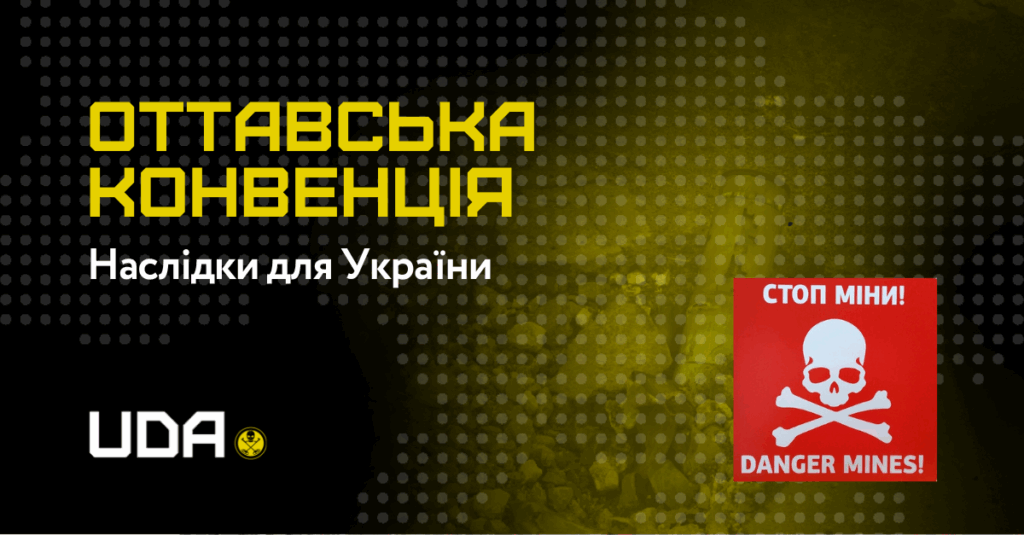Source: bukvy.org
On July 15, Ukrainian parliament suspended the Ottawa Convention, which prohibits the production, use, and stockpiling of anti-personnel mines. Ukraine joined the convention in 2005, when there was no threat of full-scale war, in order to comply with international standards and protect civilians. Russia, on the other hand, did not sign the convention and has been using mines extensively since 2014, gaining an asymmetric advantage.
Tymur Pistriuha, chairman of the Ukrainian Deminers Association, commented on this.
For the government, this is a necessary step for defense, but for international partners, it is a cause for concern, as Ukraine’s reputation and the protection of civilians are at stake. I will explain below what consequences this decision will have for the front lines and the population.
My position: I support Ukraine’s withdrawal from the Ottawa Convention.
> First, defense is paramount. Ukraine is at war with an enemy that has not signed the Ottawa Convention and systematically uses anti-personnel mines, so we find ourselves in unequal conditions. Mining the front line is not an offensive action or a matter of civilian safety, but a critically important element of defense strategy: it closes approaches to positions, controls borders, deters the enemy, and increases the combat capability of units. In addition, the use of mining to strengthen defense capabilities increases the safety of the population by reducing the risk of attack and loss of territory.
> Secondly, Ukraine is not the only country to withdraw from the convention. Latvia took this step in April, followed by Lithuania, and in June Poland, Finland, and Estonia joined them. The reason is the same for all of them: Russian aggression, which has disrupted the security balance in Europe. When the enemy uses anti-personnel mines on a massive scale, the restrictions of the convention do more harm to our defense than they do to protect civilians. The Ottawa Convention, adopted back in 1997, does not correspond to modern realities and does not guarantee security. Ukraine has conscientiously fulfilled its obligations and destroyed stocks of ammunition prohibited by the Ottawa Convention, but we have not received any leverage or real security guarantees.
> Third, there are alternatives. Ukraine is waging war in conditions of massive mining, so we need tools that combine defense capabilities and protection of the population. One such tool is EWIPA (Explosive Weapons in Populated Areas), an international political declaration aimed at reducing civilian casualties during war, which has already been supported by 88 states, including Poland and the Baltic countries. Unlike the Ottawa Convention, EWIPA does not impose legal obligations to destroy ammunition and does not limit a state’s defense capabilities. This gives Ukraine the opportunity to use mining as a means of deterring the enemy, while demonstrating its willingness to minimize harm to the civilian population and declaring its intention to adhere to humanitarian standards even in the difficult conditions of war.
Joining EWIPA would send an important signal to international partners: Ukraine combines defense capabilities with responsibility for the lives of its citizens. This would strengthen trust, guarantee support and funding for demining and defense, and strengthen Ukraine’s position at the diplomatic level, showing that the state acts in a balanced and strategic manner.
It is now important that Ukraine’s decision to withdraw from the Ottawa Convention is understood by both international partners and citizens. The Ukrainian Deminers Association, together with the relevant state structures, is developing a clear narrative and preparing for international events, in particular the conference in Tokyo (Ukraine Mine Action Conference 2025). It is important to convey that Ukraine’s withdrawal from the convention does not increase the risk to civilians and does not lead to mass mining, but only allows the state to defend its positions. Any increase in the number of mines in urbanized Ukrainian territories is exclusively related to the actions of the enemy.
It is important for citizens to know that Ukraine does not mine populated areas, but only uses mines on the front lines and borders to prevent enemy advances and protect people. However, civilians should be cautious, as any explosive object is potentially dangerous. Do not walk in mined areas, attempt to defuse ammunition yourself, or collect scrap metal from dangerous objects. At the same time, the state must strengthen its control over the circulation of weapons and ammunition and increase the penalties for improper handling of them in order to minimize the risks to the population.
Therefore, Ukraine’s withdrawal from the Ottawa Convention is a necessary and timely step to protect the country. At the same time, it is important to have an alternative agreement, such as EWIPA, to demonstrate responsibility to international partners. This will strengthen trust, guarantee support and funding for demining and defense, and confirm that Ukraine is acting strategically and safely to protect its people and its positions.
Follow the most relevant events of the Association on our Facebook page
Read the latest news of the Association in the section Latest events

